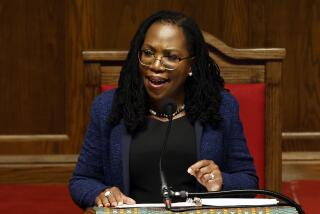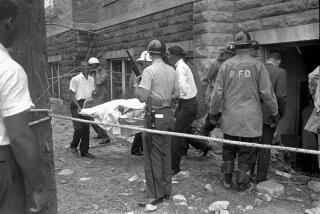Jury Begins Deliberating ’63 Church Bombing Case
- Share via
BIRMINGHAM, Ala. — Through seven days of testimony, Bobby Frank Cherry has sat impassively in a courtroom as witnesses and prosecutors branded him a vile symbol of the Old South--a racist, a murderer, a terrorist and a man who had made a religion out of hating blacks.
His granddaughter said she’d heard him boast of “blowing up a bunch of niggers back in Birmingham.” Other relatives said his participation in an attack on a Baptist church 39 years ago that killed four girls was common knowledge in the family. A video clip played in court showed Cherry putting on brass knuckles at a civil rights protest and punching a black man.
For a week, Cherry, 71 and a former Marine demolition expert, has seemed almost uninterested. He watched the video with no sign of emotion and didn’t pay much attention to the parade of witnesses linking him to the bombing of the 16th Street Baptist Church on Sept. 15, 1963.
Cherry, gray-haired, bespectacled and dressed in a dark suit, eyed the jurors each time they filed back to their box after a recess but otherwise appeared detached from the proceedings in a trial that has mesmerized Birmingham.
On Tuesday, the prosecution and the defense gave their closing arguments, and the jury began deliberating the four murder counts that could send Cherry to prison for life. With four alternate jurors excused, the final makeup of the panel was six men and six women. Three of the men are black, the other nine jurors are white. The panel deliberated about 2 1/2 hours before recessing for the night.
In many ways, the trial has been a history lesson of the civil rights movement, with references to the days when Gov. George C. Wallace had promised Alabama would see “segregation today, segregation tomorrow, segregation forever.” The church bombing took place five days after Birmingham’s public schools were integrated.
Cherry, who belonged to one of the most violent wings of the Ku Klux Klan, was questioned by FBI agents as a key suspect after the bombing but was not indicted until two years ago. He testified before the grand jury that indicted him but did not speak in his own defense at the murder trial.
His attorneys say he is easily confused and did not provide much help in preparing his defense. Last year, Cherry was diagnosed with vascular dementia, a disorder that can cause losses of memory and awareness.
Cherry is the last of four suspects in the deadliest single attack against the civil rights movement. Thomas Blanton Jr. was convicted last year and is serving a life term, Robert “Dynamite Bob” Chambliss was convicted in 1977 and died in prison, and Herman Cash died in 1984 without being charged. Testimony during Cherry’s trial linked all four as close associates.
“For almost 39 years, this defendant has mocked justice,” Assistant U.S. Atty. Don Cochran said in his summation Tuesday. “He was the prime suspect from the start. The time for justice is here. It’s long overdue.” Then he spoke the names of the victims as their pictures flashed on a video screen: Addie Mae Collins, Carole Robertson and Cynthia Wesley, all 14, and Denise McNair, 11.
While prosecution witnesses filled a week of the court calendar, Cherry’s attorney, Mickey Johnson, wrapped up his rebuttal in a day, calling only a handful of witnesses to speak of Cherry’s redeeming qualities.
Those few included two grandsons who had lived with Cherry and said that they had never heard him refer to the bombing or his membership in the Klu Klux Klan, and a friend of Cherry who said the defendant had joined a multiracial church in 1997 and had once counseled him against joining the Klan.
Johnson said in his closing that the statements incriminating Cherry were inconsistent and that the witnesses who testified against him were unreliable. Although not denying Cherry was a racist, he said the defendant had undergone the same metamorphosis as Birmingham itself from the 1960s to the 1990s, as evidenced by his church membership.
More to Read
Sign up for Essential California
The most important California stories and recommendations in your inbox every morning.
You may occasionally receive promotional content from the Los Angeles Times.













